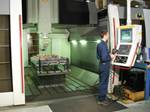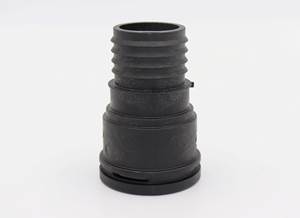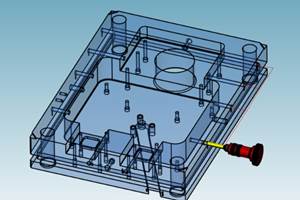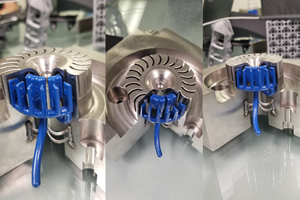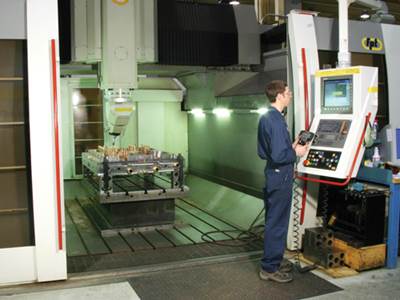Richmond Tooling, Inc.: Tooling, Inc.: Success with Small Mold Building Niche
A group of 11 dedicated employees—several with more than 10 years with the company—are able to keep overhead costs down and pass those savings onto its customers.
Founded in 1985 in Roger McGinnis’s basement, Richmond Tooling, Inc. (Colonial Heights, VA) has evolved into a 7200 square-foot facility, specializing in manufacturing plastic injection molds for small molded parts under one ounce (up to 16 cavities) in the medical, electrical, automotive, consumer, military/defense and packaging markets. A group of 11 dedicated employees—several with more than 10 years with the company—are able to keep overhead costs down and pass those savings onto its customers.
According to Richmond Tooling, Inc. President Roger McGinnis, the company’s work in the defense industry has allowed them to even out their workload in the past when the economy began its downturn. “Our customers that serve the defense industry are less likely to outsource any of their products,” he notes. This has helped the company face the challenge of foreign competition. “We have been competing with the outsourcing of molds to China and other parts of the world,” he says. To successfully compete with China, Richmond Tooling began to reevaluate their processes and invest in new equipment to decrease leadtimes.
“During our evaluation, we learned that we were spending a lot of time running electrodes,” McGinnis elaborates. “So we invested in an Erowa Robot Multi, which has not only helped us streamline the process, but also allowed us to run electrodes while the lights are out—which resulted in cutting our leadtimes.” This robot has an axis travel X of 1200 mm (to left and right) and an axis travel Z of 1450 mm.
“We also learned about hard milling,” McGinnis continues. “Hard milling is faster and more accurate due to our Mori Seiki NV5000 with a 12,000-rpm spindle. If we have contoured shut-offs, we can get them right the first time; and it speeds up the process, especially with getting the blocks to heat treating. We mill fewer details, go to heat treat and then come back and add the details.”
During this time Richmond Tooling also became more involved with the AMBA. McGinnis believed the shop would realize more benefits by networking with colleagues. “The last two years I went to Washington, DC with the AMBA and talked to Senators and Representatives about my and other mold builders’ needs,” McGinnis notes. “While I felt that the politicians understand our challenges on a personal level, I don’t see any results yet on the national level. We will keep trying to get our message out there.”
McGinnis also is tapping into industry resources to find apprentices. “I have been a part of John Tyler Community College’s—our local junior college——manufacturing department advisory committee, attending meetings and advising the committee about shifting from manual machines to CNC,” he explains. “I also am trying to take things to the next level by meeting with the professor and director of the department to show them some ideas that other mold builders have done in their areas, like the Apprenticeship 2000 program Steve Rotman of Ameritech Die & Mold has been involved with.” (See Apprenticeship 2000 Sidebar.)
Training is high priority at Richmond Tooling. In addition to providing OSHA training, the company also offers its employees the opportunity to register in the apprenticeship program through the Virginia Department of Labor. Once the requirements (8,000 hours) are complete, the employee receives a journeyman card. “We also invest in software maintenance for CAD/CAM so our employees can talk to technical support on all issues,” McGinnis states.
Training and education also takes place through the trade magazines the employees read; and McGinnis sends them to trade shows to see the latest equipment and technology firsthand—as well as experience the opportunity to network with peers about methods and practices.
As a result, Richmond Tooling’s employees are a happy bunch. “Our employees like the family-friendly atmosphere here,” McGinnis says. “With the small number of employees, not only do we know their name, we know their family too! We also offer great healthcare benefits, a free Friday lunch and flexible hours.”
CNC Operator/Programmer Jeff Pitman notes that the flexible hours makes it easier for his family and allows him to spend more time with his children. In agreement is Wire EDM Operator/Programmer Mike Bevan. “Flexible hours and good benefits, like the Friday lunch,” make working here worthwhile,” Bevan says.
When Richmond Tooling is looking for new talent, the company looks no further than the local community college. In fact, McGinnis says they have partnered with the college to recruit directly from the Machinist Program and the Quick Connect Program. The company also advertises online through Craigslist to attract younger people.
Richmond Tooling is hoping to expand into new industries over the next year through networking and word-of-mouth. McGinnis notes that a new company has just moved into the area that does aerospace work, and he hopes to secure some of their work on a support level, since Richmond Tooling does not possess the certifications to do mold work in the aerospace industry, but the company can perform secondary operations without certification.
Plans also include additional training with CAM programming and hard milling. “We will continue to fine tune our processes and maximize the use of our new equipment,” McGinnis concludes. “We have the capabilities to be even more efficient.”
Related Content
Five-Axis Vertical Mill Increases Mold Shop Capacity by Reducing Setups
Zero Tolerance now processes blocks — from squaring to waterline drilling to rough and finish milling — on a single five-axis CNC mill, reducing setups and moving blocks in/out of multiple machines without sacrificing accuracy and surface finish.
Read MoreHow to Harness 3D Scanning for Mold Tool Repairs
3D scanning supports the repair of molds with no history, drawings or design files.
Read MoreCAM Automation Increases Mold Production, Quality
Mold builder switches CAM software package after 20 years to take advantage of innovative programming strategies that reduce mold machining programming and processing times.
Read MoreLarge Hybrid Steel Insert Solves Deformation, Dimensionality, Cycle Time Problems
DMLS printers using metal additive powders selected by Linear AMS to produce high-quality, accurate, consistent 3D-printed mold components with certification and traceability.
Read MoreRead Next
Triangle Tool: Product-to-Tool Service
This Large Shop Leadtime Leader Winner penetrates new markets with complete product-to-tool service while investing in technology.
Read MoreHow to Use Continuing Education to Remain Competitive in Moldmaking
Continued training helps moldmakers make tooling decisions and properly use the latest cutting tool to efficiently machine high-quality molds.
Read MoreHow to Use Strategic Planning Tools, Data to Manage the Human Side of Business
Q&A with Marion Wells, MMT EAB member and founder of Human Asset Management.
Read More
